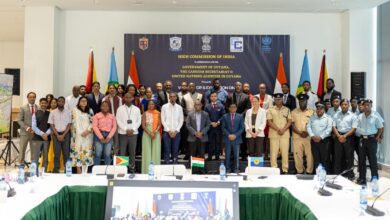The Ninth Meeting of the Council for Human and Social Development (COHSOD) of the Caribbean Community (CARICOM) was convened in Georgetown, Guyana on 8-10 October 2003, under the Chairmanship of the Hon. Lawrence Achong, Minister of Labour and Small and Micro-Enterprise Development, Trinidad and Tobago.
Ministers in attendance were: the Hon. Rawle Eastmond, Minister of Labour, Barbados; the Hon. Marcial Mes, Minister of Human Development, Local Government and Labour, Belize; Sen. the Hon. Lawrence Joseph, Minister of Labour and Local Government, Grenada; Dr. the Hon. Rev. Dale Bisnauth, Minister of Labour, Human Services and Social Security, the Hon. Dr. Leslie Ramsammy, Minister of Health and the Hon. Ronald Gajraj, Minister of Home Affairs, Guyana; and the Hon. Velon John, Minister (Industrial Relations), Saint Lucia.
Representing the Cayman Islands was the Hon. Roy Bodden, Minister of Education, Human Resources and Culture.
Suriname was also represented.
OPENING CEREMONY
The Opening Ceremony was chaired by Dr. Edward Greene, Assistant Secretary-General, Human and Social Development, CARICOM Secretariat, who welcomed Delegates and noted that the theme of this Meeting was “Investing in Human Resources with Special Reference to Labour”. He adverted to the achievements of the Human and Social Development Directorate since the last Regular Meeting, which accorded with the COHSOD’s theme for the biennium, Investing in Human Resources with Equity, and which recognised the synergies within the sector. Reference was made to activities relating to assistance to disadvantaged groups; the staging of CARIFESTA VIII in Suriname; the free intra-regional movement of people and standardisation of accreditation of skills within the context of the CARICOM Single Market and Economy; the CARICOM Youth Ambassador Programme and its contribution to Youth and Development; and coordination of the Regional Task Force on Crime and Security.
He thanked the Hon. Walter Sandriman, Minister of Education and Development, Suriname and Outgoing Chair of the COHSOD for his excellent stewardship of the Council and welcomed the Hon. Lawrence Achong, Minister of Labour and Small and Micro-Enterprise Development, Trinidad and Tobago and Incoming Chair of the COHSOD.
Dr. the Hon. Rev. Dale A. Bisnauth, Minister of Labour, Human Services and Social Security, Guyana, extended a warm welcome to Delegates on behalf of the Government and People of Guyana. He congratulated Mr. Phillip Moore, renowned Guyanese Artist, whose contribution to culture was being recognised. He noted that the Meeting was taking place in a world dominated by trading blocs, which underscored the vulnerability of small states and observed that they should not feel threatened, but rather, challenged by it.
Due to the unavoidable absence of His Excellency Michael Jong Tjien Fa, Minister of Trade and Industry of Suriname and Outgoing Chair of the COHSOD, his message was read by Assistant Secretary-General Greene. Highlighted were the activities undertaken during the tenure of Suriname in the Chair, with particular reference being made to the CARICOM Youth Ambassadors initiative, collaboration in Health, and the staging of CARIFESTA VIII. In respect of CARIFESTA, he acknowledged with appreciation the yeoman service of Dr. Carole Maison-Bishop and the invaluable assistance rendered by Mr. Leonard Robertson of the Secretary-General’s Office.
In his address, the Honourable Lawrence Achong, Minister of Labour and Small and Micro-Enterprise Development, Trinidad and Tobago voiced his delight that the agenda was devoted almost entirely to Labour issues and noted that the Meeting was being convened at a strategic time, following closely upon the Thirteenth Inter-American Meeting of Ministers of Labour which had examined the impact of globalisation.
He urged an integrated approach to trade negotiations given the key role to be played by Labour in globalisation and integration agendas and indeed, the development agendas of countries. In this regard, he called for the establishment of a link between the Caribbean Regional Negotiating Machinery and regional labour meetings, and for frequent interaction between Ministries of Trade and Labour at the national level, in order to ensure that the quality of life of the Region’s peoples was not adversely affected as a result of these negotiations. He asserted that to function effectively in the present environment, Labour Ministries needed to be retooled, retrained and restructured. He concluded by urging the COHSOD to take the lead in establishing stronger links with other Ministerial Councils and in particular, the Council for Trade and Economic Development.
The Hon. Edwin Carrington, Secretary-General, Caribbean Community in his address, stated that he was particularly impressed by the rapid progress made in the youth and development programme and the leadership role played by Suriname in ensuring that their two CARICOM Youth Ambassadors were truly integrated in, and responsive to the National Youth Programme.
He adverted to the complex issues confronting labour, for example, enhancing the competitiveness of the work force in the current challenging, ever-evolving global arena; negotiating the maze of conditionalities, rules and regulations in hemispheric and international organisations; and especially, the requirements for the free intra-regional movement of skills in the CARICOM Single Market and Economy (CSME). He stressed that this requires full understanding of the processes involved and a regional commitment to the pursuit of a collective strategy in its negotiations.
PRESENTATION OF AWARD TO MR. PHILLIP MOORE
On behalf of H.E. Runaldo Venetiaan, President of Suriname, the Hon. Edwin Carrington, Secretary-General, CARICOM presented an award to Mr. Phillip Moore, internationally acclaimed Guyanese artist who was one of five Caribbean artists selected to participate in the Extraordinary Palace Exhibition of Fine Arts by Distinguished Artists of the Caribbean held during CARIFESTA VIII.
Mr. Moore in his brief remarks to the gathering expressed his gratitude for this honour and noted that his philosophy was underpinned by the notion that the two scourges of humanity were greed and ignorance.
LABOUR ISSUES IN THE CONTEXT OF REGIONAL AND GLOBAL DEVELOPMENTS
The COHSOD noted the challenges facing Labour in Region in the context of the establishment of the CARICOM Single Market and Economy and the Region’s hemispheric and international trade relations. It recognised the imperative of retraining and reorganising the work force, as well as the need for Labour itself and the other social partners to be involved in the development and implementation of policies and programmes to facilitate the viability and competitiveness of workers.
The COHSOD agreed that the work of the Futures Policy Group should be supported and recommended that among the indicators that should be highlighted are workforce enhancement, the new culture for labour, and anti-discriminatory regulations.
FREE MOVEMENT OF PERSONS
The COHSOD noted that all Member States, except Haiti, Montserrat and St. Kitts and Nevis, had operationalised the free movement of wage-earning categories of workers. They noted that the CSME arrangements should also make provision for the movement of unskilled labour. They also noted the security concerns expressed relating to free movement.
In respect of Hassle-Free travel, the COHSOD noted that measures had been taken by Member States to establish common lines for CARICOM Nationals and that some Member States were prepared to accept Identification Cards which were not machine-readable as an interim measure.
THE ROLE OF LABOUR IN THE SOCIAL DIALOGUE
The COHSOD recognised the overall concerns of labour and the need to rectify inequities relating to illiteracy, training, persistent unemployment, inadequate remuneration, job security and workers’ health.
The COHSOD agreed that the voice of labour is important in the formulation of policies as well as in trade negotiations and pointed to the social compact in Barbados as a possible model.
LABOUR ISSUES IN INTERNATIONAL AND HEMISPHERIC NEGOTIATIONS
The COHSOD discussed issues affecting Labour in hemispheric and international negotiations and recognised the imperative of the involvement of Ministries of Labour in the negotiating process.
The COHSOD agreed that Ministers of Labour should collaborate closely with Ministers of Trade on labour issues in the FTAA process, especially since Ministers of Labour of the hemisphere have been discussing the labour dimension of the FTAA process for the last five years under the aegis of the OAS in order to respond to the mandates of the Heads of State in the Summit of the Americas.
The COHSOD also agreed that Member States should facilitate the participation of Labour Officials in this process in order to adequately represent the views and interests of the Community.
The COHSOD further agreed that the representation of Officials of the Secretariat in these meetings should be assured in order to provide critical guidance to Member States.
TECHNICAL AND VOCATIONAL EDUCATION AND TRAINING
The COHSOD reiterated the imperative of ensuring that the process of training and re-training was accelerated, utilizing the Technical and Vocational Education and Training structure so that the work force would be trained. in a broad spectrum of skills to ensure their competitiveness in the current economic environment and agreed that schools curricula should prepare students for participation in the ICT-driven global economy.
DECENT WORK
The COHSOD considered the concept of “Decent Work” and noted the work, which needs to be undertaken in respect of defining and treating with this concept.
The COHSOD noted the work done by the Community in the area of labour standards and legislation, consistent with international core standards.
LABOUR MARKET INFORMATION SYSTEM
The COHSOD received a report on the status of national Labour Market Information Systems (LMIS), which had been established in all Member States. They recognised the need for training of relevant staff to maintain the System. The COHSOD noted with pleasure the willingness expressed by the International Labour Organisation to cooperate with the Secretariat in issues relating to the LMIS.
ACCREDITATION AND STANDARDISATION AND THE IMPLICATIONS FOR LABOUR
The COHSOD noted the progress, to date, on the establishment of the Regional Accreditation Mechanism, which was a key component in facilitating the free intra-regional movement of skills. The Meeting noted that National Accreditation Bodies had been established, or were in the process of being established in Member States and urged Member States to continue to comply with the programme in order to ensure that the process is completed as soon as possible.
LABOUR AND THE INTER-SECTORAL AGENDA IN HUMAN AND
HIV/AIDS IN THE WORKPLACE
The COHSOD remained concerned at the high prevalence rates in the Region, which makes the Caribbean, second only to Sub-Sahara Africa.
The COHSOD noted the exceptional work of the Pan-Caribbean Partnership against HIV/AIDS, in particular its work on stigma reduction and care and treatment.
The COHSOD expressed the hope that PANCAP would be successful in its proposal to the Global Fund.
MAINSTREAMING GENDER IN THE WORK PROGRAMME FOR LABOUR
The COHSOD was pleased to learn that the programme for mainstreaming gender has been implemented in three sectors – education, health and labour – and noted, in particular, that activities had commenced with mainstreaming gender in the Social Dialogue process.
The COHSOD agreed that this activity should be encouraged in all sectors and especially in the trade and economic development sectors.
CARICOM YOUTH AMBASSADORS PROGRAMME
The COHSOD congratulated the CARICOM Youth Ambassadors Programme on the progress made and recommended that priority be given to the development and/or refinement of indicators to measure leadership and other key goals.
CRIME AND SECURITY
THE COHSOD expressed concern about the impact of crime and violence on the cost of business and the imperative of curbing the level of crime and violence, which pose a threat to society and to the environment. The COHSOD noted the work of the Regional Task Force on Crime and Security and endorsed the priority areas for action. It urged the Task Force to address demand reduction issues as well as security issues relating free movement.
The COHSOD also noted that the important regional Conference on Border Security is scheduled for early 2004.
PRIORITIES FOR CULTURE AND DEVELOPMENT
The COHSOD considered the priorities for Culture and Development in the Caribbean, including the future of CARIFESTA. The Meeting noted the successful hosting by Suriname of CARIFESTA VIII on 24-30 August 2003. The Meeting agreed that for CARIFESTA to be sustained as a viable enterprise, it should be completely reorganised and redeveloped, based on experiences of past events.
The COHSOD agreed that a Task Force should be established to develop proposals for a Strategic Plan for a “New” CARIFESTA, and that the recommendations of the Task Force should be presented to the COHSOD for its consideration, following which the recommendations would be tabled for endorsement by the Community Council of Ministers, and then submitted for approval by the Conference of Heads of Government at its Regular Meeting in July 2004.
CARIBBEAN COMMISSION FOR HEALTH AND DEVELOPMENT
The COHSOD noted with pleasure that the Caribbean Commission for Health and Development had been launched under the chairmanship of Sir George Alleyne, OCC, former Director of the Pan American Health Organisation and currently United Nations Envoy for HIV/AIDS in the Caribbean. They also noted that the Inaugural Meeting of the Commission held in Barbados on 8-9 September 2003, produced a Plan of Action, including a series of policy studies on financing and managing health, to be accompanied by a series of policy round tables and national consultations.
The COHSOD noted that the Commission was expected to present its Final report to the Conference of Heads of Government in July 2005.
JOINT COUNCIL OF CIVIL SOCIETY
The COHSOD received a report on the work of the Task Force established to follow up on the recommendations of the Liliendaal Statement, which emanated from the Forward Together Civil Society Conference held in Guyana in July 2002.
It endorsed the proposal of the Task Force for the establishment of a Joint Council of Civil Society, which body would represent the social partners in interactions with the Conference of Heads of Government and other Organs and Institutions of the Community.
FUNCTIONING OF NATIONAL COHSODs
The COHSOD agreed that National COHSODs are a vital element in the effective functioning of the Regional COHSOD. In this regard, the COHSOD urged those Member States, which had not yet established their national COHSOD to do so as a matter of urgency.
CREATION OF CENTRES OF EXCELLENCE IN THE CARIBBEAN
The COHSOD received a report from the World Bank on the development of a network based on Information and Communication Technology platforms that would enhance the delivery of a variety of education and conference services.
The COHSOD agreed that the Secretariat would coordinate follow up actions with the Bank, including convening a Technical Working Group to examine options for establishing Centres of Excellence.
APPRECIATION
The COHSOD expressed its appreciation to the Staff of the Secretariat for the arrangements put in place, which had contributed to the success of the Meeting.





